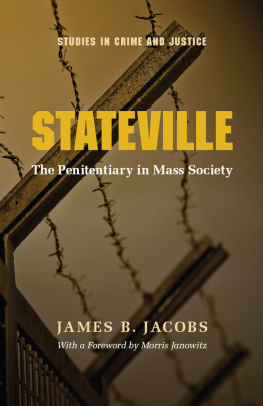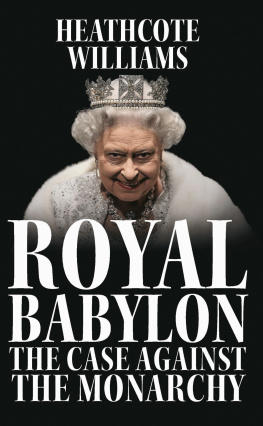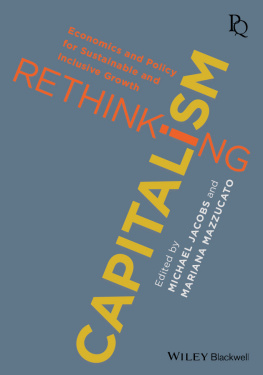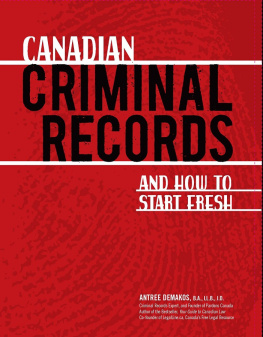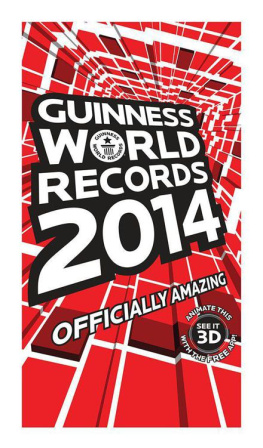Copyright 2015 by the President and Fellows of Harvard College
All rights reserved
Jacket design by Lisa Roberts
978-0-674-36826-2 (hardcover)
978-0-674-96716-8 (EPUB)
978-0-674-96717-5 (MOBI)
The Library of Congress has cataloged the printed edition as follows:
Jacobs, James B., author.
The eternal criminal record / James B. Jacobs.
pages cm
Includes bibliographical references and index.
1. Criminal recordsUnited States. 2. Criminal recordsAccess controlUnited States. 3. Criminal recordsExpungementUnited States. I. Title.
KF9751.J33 2015
345.73'0123dc23 2014015343
Lovingly dedicated to my wife, Jan,
our children, Tom and Sophi,
their spouses, Caroline and Jon,
and our grandchildren, Rowan and Anna
MOST ACADEMICS come to criminal record issues via their commitment to offender rehabilitation and reentry. While I share that concern, I was drawn to criminal records via research on gun control. The 1968 Gun Control Act established the foundational principle of U.S. firearms policy. Law-abiding people should have easy access to firearms, while criminals (and a few other unreliable categories) should be prohibited from purchasing or possessing firearms. A felony conviction distinguished a law-abiding person from a criminal; years later, Congress disqualified persons convicted of domestic violence misdemeanor convictions. The 1968 act required a person purchasing a firearm from a federally licensed firearms dealer (FFL) to fill out a document swearing he or she had never been convicted of a felony. However, there was no way for the dealer to verify the truth of these statements. In response, gun control proponents lobbied for a law mandating that prospective purchasers be subjected to a criminal record check by a designated state or county chief law enforcement officer. The NRA and other gun owners rights groups opposed the idea on the ground that criminal record checking would require a substantial waiting period.
The logjam-breaking compromise that allowed passage of the 1993 Brady Handgun Violence Prevention Act added a provision to the bill requiring that, by 1998, the U.S. Department of Justice (DOJ) create a computerized National Instant Criminal Background Check System (NICS) that would inform an FFL within three business days whether a pending firearms sale could be completed. However, at that time, most states police and court records could not support such a sophisticated information system. Consequently, Congress authorized hundreds of millions of dollars to upgrade criminal records. The result, perhaps the most important legacy of the Brady law, was massive federal assistance to improve police and court records. By 1998, NICS was operational.
The nationally integrated rap sheet system (Interstate Identification Index, or Triple I) made it possible for a police officer with access to a computer to find out practically instantly whether a suspect or arrestee had ever been arrested federally or in any state. This upgrade of the nations criminal record infrastructure, both police records and court records, also made criminal background checking for nonlaw enforcement purposes much easier, faster, and cheaper. Numerous private information vendors emerged to meet the growing demand for criminal background reports. The availability of inexpensive background checking plus the vendors aggressive marketing stoked the demand.
When I later turned my full-time attention to criminal records jurisprudence and policy, I assumed that there was little research and writing on criminal records issues. I was wrong. There is an impressive corpus of studies and reports produced by SEARCH, the National Consortium for Justice Information and Statistics, an organization created in 1969 by the Law Enforcement Assistance Administration (LEAA) to improve the quality of justice and public safety through the use, management, and exchange of information; application of new technologies; and responsible law and policy, while safeguarding security and privacy. SEARCH (not an acronym) has produced more than a dozen book-length reports on such topics as standards for security and privacy of criminal record history information, public attitudes toward uses of criminal history information, appropriate criminal justice and noncriminal justice uses of juvenile records, commercial sale of individual criminal history information, proliferation of criminal background checking, and consequences of identity theft for operation of state criminal record repositories.
The NYU Law seminar on criminal records policy and jurisprudence (which I taught three times in five years) unearthed dozens of interesting and important legal, policy, and jurisprudential criminal record issuesfor example, whether the exclusionary rule applies to searches predicated on mistaken records; whether a three strikes and youre out recidivist sentencing premium is unconstitutional; whether a witness or testifying defendant can be impeached with prior conviction(s); whether any constitutional right is violated by a police chief distributing to local merchants an Active Shoplifters bulletin that includes the names and photos of persons previously arrested but not charged; whether an alien defendants guilty plea is valid if his defense lawyer mistakenly told him that a drug trafficking conviction would not affect his immigration status; whether an employer who discriminates on the basis of criminal record violates Title VII of the Civil Rights Act; whether the Freedom of Information Act can be used to obtain individual criminal history information from the FBI; whether a state criminal record expungement prevents prosecution of the expungement beneficiary for violating the federal felon-in-possession-of-a-firearm law. The more I focused on criminal records issues, the more I saw their centrality for law enforcement, adjudication, and correction and to the criminal justice systems impact on society. (My mentor and friend Frank Zimring called criminal records the 800-pound gorilla in the room.) Just by itself, the annotated appendix of Supreme Court cases at the end of this book makes a strong case for the importance of criminal records for criminal law, procedure, and justice policy.
Except for the juvenile justice area, criminal justice scholars have treated criminal record policies as unproblematic and inevitable. The whole range of criminal recordsincluding criminal intelligence databases, police blotters, rap sheets, court records, presentence reports, prosecutors files, probation files, jail and prison databaseswarrants scrutiny, but to date these diverse and overlapping records have never even been catalogued. It is past time to ask (1) how criminal justice agencies and courts are using individual criminal history information and (2) whether these criminal records are suitable for noncriminal justice users. Although this is the first book to focus directly on the creation, dissemination, use, and consequences of criminal records in the United States, I am not writing on a blank slate. There is a long sociological tradition illuminating the consequences of criminal labeling. Indeed, the juvenile court movement was sparked by the insight that a criminal record inflicts a stigma that has enormous negative consequences for the convicted person. The juvenile court founders sought to protect delinquent youth from the stigmatizing effects of a lifelong criminal record. In the mid-twentieth century, a number of labeling theorists, including Howard Becker, Edwin Lemert, and Ed Schur, argued that people stigmatized as criminals are treated like criminals and often come to define themselves as criminals. Erving Goffmans classic,




